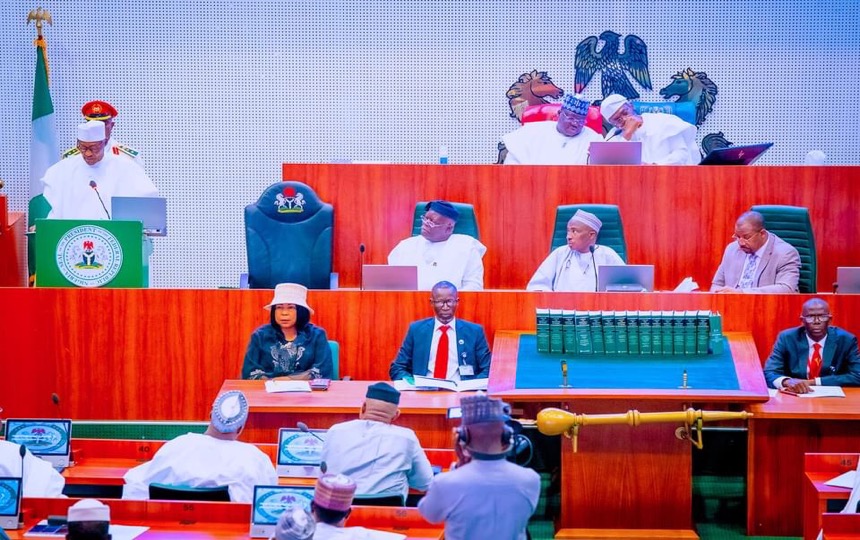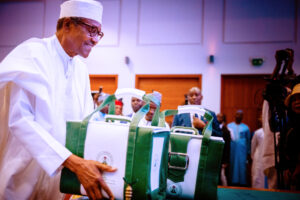

President Muhammadu Buhari has urged the leadership of the National Assembly to stop approving the budgets for Government Owned Enterprises (GOEs) without undergoing proper protocols.
Buhari said the passage of such budgets “is against the rules and needs to stop”.
He said this on Friday during the presentation of a budget of N20.5 trillion to a joint session of the National Assembly for the 2023 fiscal year.
President Buhari, however, urged the federal lawmakers to ensure that the budget presented, “which includes those of the GOEs”, be returned to the Presidency when passed.

“The current practice where some committees of the National Assembly purport to pass budgets for GOEs, which are at variance with the budgets sanctioned by me, and communicate such directly to the MDAs is against the rules and needs to stop,” he said.
The President, who described the 2023 appropriation as a budget of “fiscal sustainability and transition”, said the budget “reflects the serious challenges currently facing our country, key reforms necessary to address them, and imperatives to achieve higher, more inclusive, diversified and sustainable growth.”
He said: “A total expenditure of N20.51 trillion is proposed for the Federal Government in 2023. This includes 2.42 trillion Naira spending by Government-Owned Enterprises.
“The proposed 20.51 trillion Naira 2023 expenditure comprises Statutory Transfers of N744.11 billion; Non-debt Recurrent Costs of N8.27 trillion; Personnel Costs of N4.99 trillion; Pensions, Gratuities and Retirees’ Benefits of N854.8 billion; Overheads of N1.11 trillion; Capital Expenditure of N5.35 trillion, including the capital component of Statutory Transfers; Debt Service of N6.31 trillion; and Sinking Fund of N247.73 billion to retire certain maturing bonds.
READ ALSO: Varsities, others get N470bn for revitalisation, salary enhancements
“We expect total fiscal operations of the Federal Government to result in a deficit of N10.78 trillion. This represents 4.78 percent of estimated GDP, above the 3 percent threshold set by the Fiscal Responsibility Act 2007.
“As envisaged by the law, we need to exceed this threshold considering the need to continue to tackle the existential security challenges facing the country.
“We plan to finance the deficit mainly by new borrowings totalling N8.80 trillion, N206.18 billion from privatisation proceeds, and N1.77 trillion drawdowns on bilateral/multilateral loans secured for specific development projects/programmes.
“Over time, we have resorted to borrowing to finance our fiscal gaps. We have been using loans to finance critical development projects and programmes aimed at further improving our economic environment and enhance the delivery of public services to our people.
“As you are aware, we have witnessed two economic recessions within the period of this Administration. A direct result of this is the significant decline in our revenue-generating capacity.
“In both cases, we had to spend our way out of recession, resulting in higher public debt and debt service. It is unlikely that our recovery from each of the two recessions would have been as fast without the sustained government expenditure funded by debt,” President Buhari stated.
Suspected herdsmen have killed 17 persons and injured many in Logo and Ukum Local Government…
Three officers of the National Drug Law Enforcement Agency (NDLEA) have been hospitalised for gunshot…
Former President Goodluck Jonathan has urged Christians and other Nigerians to leverage the lessons of…
President Bola Tinubu has felicitated Christians in Nigeria on Easter celebration in the country. Tinubu…
Kaduna State Governor Uba Sani says his administration has removed one of the barriers to…
The Academic Staff Union of Universities (ASUU) in the Kaduna State University (KASU) is on…
This website uses cookies.